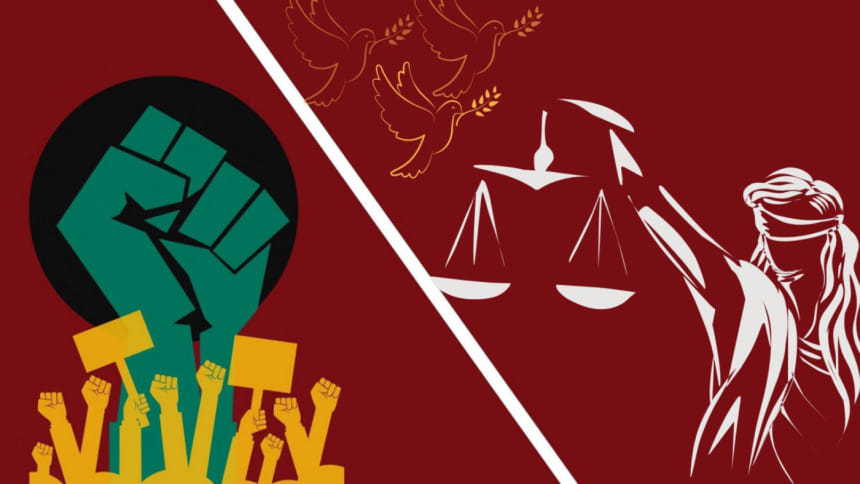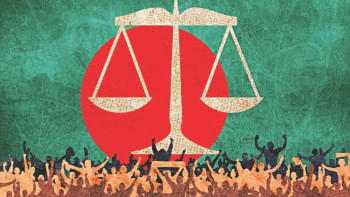Why victims must lead Bangladesh’s truth commission

The recent declaration by Law Advisor Dr Asif Nazrul to establish a Truth and Reconciliation Commission (TRC) in Bangladesh marks a significant step in Bangladesh's journey towards justice and healing for victims of July massacre and the preceding authoritarian regime. The proposed commission, a long-overdue initiative, appears to be a promising attempt at confronting the dark legacy of political repression, state violence and enforced disappearances in Bangladesh.
However, for the commission to be successful, it must be grounded in an inclusive, holistic and sustainable framework. Three urgent recommendations are offered here that can shape the formation of the proposed commission into a successful tool for healing. First, the framework of the commission including its role and responsibilities must go through broad consultations to ensure inputs from experts, victims, and marginalised sections of the society. Second, it must be inclusive, especially of victims including those who are not from Dhaka, and start with a national dialogue with all stakeholders beyond Dhaka or divisional centres. Third, it must also include experts in post-conflict justice who specialise in the field. Also, the commission's mandate and modus operandi must be clearly set before deciding the composition of the body.
This transitional justice effort also needs a contextualised framework rooted within the unique sociopolitical realities and psychosocial complexities of Bangladesh and its people. Instead of importing Western case study models, Bangladesh needs to develop its own transitional justice model based on its local political, sociocultural and spiritual norms and values. For instance, truth-telling as developed in South Africa were based on Christian values of catharsis and forgiveness that might be incompatible with the psychosocial conditions of a Muslim majoritarian country like Bangladesh. Hence, Bangladesh needs to develop a decolonial transitional justice model that addresses past harms and fosters healing, tolerance and harmony in the context of its present sociopolitical maladies.
Furthermore, the proposed formation of a TRC presumes that victims are ready to reconcile with perpetrators who, till date, have shown neither remorse nor acknowledgment of their crimes. In fact, many individuals affiliated with the Awami League continue to exhibit wilful arrogance by denying wrongdoing, justifying abuses, and gaslighting survivors. In such a context, "healing" is a far more appropriate focus than reconciliation. The term "Truth and Healing Commission (THC)" thus more accurately reflects the needs of victims. Reconciliation may become an eventual outcome of the process but it certainly cannot begin until perpetrators take full responsibility for their actions—something that has yet to happen. Until now, no high-level Awami League official has issued a public apology. There has been no attempt to acknowledge harm, no evidence of reflection, and certainly no expression of remorse.
Consequently, the government must commence an inclusive national dialogue and consensus building with all stakeholders involved at the outset, before setting up the commission. Besides politicians, law practitioners, and civil society bodies, the commission needs to include victims such as families of the disappeared, survivors of political detention and repression as active stakeholders. Victims and their families deserve more than a token gesture, they need a meaningful platform where their stories are heard, their pain acknowledged, and their needs addressed. Without their active participation, any commission risks being seen as a top-down, Eurocentric initiative lacking authenticity and grassroots moral authority. It will just be an attempt to check a political box rather than building a real foundation for justice, accountability and healing.
Including Bangladeshi academic experts, particularly those specialising in post-conflict transitions and reconciliation processes, can ensure that the THC addresses not only symptoms of violence but its deep-rooted causes as well. In Bangladesh, where history is routinely politicised and distorted, having a strong evidence-based framework for truth and healing is essential to ensure credibility. Without involvement of experts specialised in this field, the commission risks becoming an echo chamber of political convenience rather than a mechanism of meaningful accountability.
A politically motivated commission, which is not properly designed to meet the needs of the victims, would entrench impunity, insult victims, and embolden future perpetrators. Furthermore, the establishment of the THC and its relevant laws must not be implemented hurriedly.
The commission should be led by an inter-ministerial process as transitional justice goes beyond criminal accountability. A truly victim-centred, trauma-informed, decolonial truth and healing commission could be a watershed in our political history. Done wrong, it will be yet another historic missed opportunity; another hollow promise made in the name of justice. And Bangladeshi citizens have had too many hollow promises already.
Barrister Tajriyaan Akram Hussain is an associate at Mahbub & Company and an advocate at the District and Sessions Judge Court in Dhaka.
Dr Muhammad Asadullah is an associate professor in the Department of Justice Studies at the University of Regina in Canada.
Nousheen Sharmila Ritu is executive director of UK-based think tank Bangladesh 2.0 Initiative.
Md. Harun-Or Rashid is an adjunct professor and PhD candidate at the Kent State University.

 For all latest news, follow The Daily Star's Google News channel.
For all latest news, follow The Daily Star's Google News channel. 






Comments